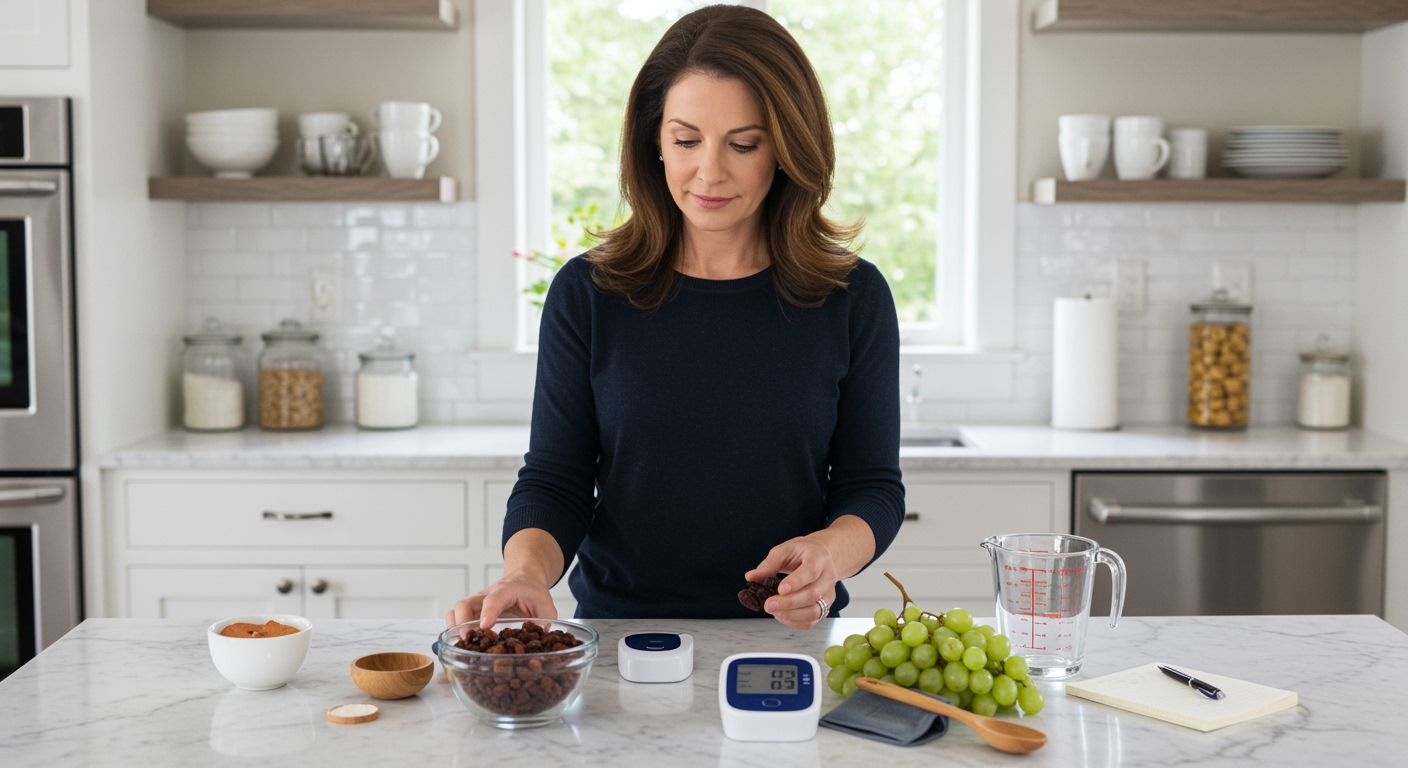✪ Key Takeaway: Raisins can help raise low blood pressure through potassium content and natural sugars that support circulation.
Introduction
Your doctor mentions your blood pressure is running low again during your routine checkup.
You wonder if there are simple foods that could help boost those numbers naturally without reaching for medication right away.
Hi, I’m Abdur, your nutrition coach and today I’m going to explain how raisins can be a surprisingly effective tool for managing low blood pressure through their unique nutritional profile.
What Makes Raisins Effective for Low Blood Pressure?
Raisins contain a powerful combination of potassium and natural sugars that work together to support healthy blood pressure levels.
The potassium content in raisins helps regulate fluid balance in your body by working with sodium to maintain proper blood volume.
When your blood pressure runs low, your body needs adequate fluid volume to maintain proper circulation throughout your organs and tissues.
The natural fructose in raisins provides quick energy that can help stabilize blood sugar levels, which directly impacts blood pressure regulation.
Research from the American College of Cardiology shows that regular raisin consumption can have measurable effects on blood pressure readings within just a few weeks.
The concentrated nutrients in this dried fruit make it more potent than fresh grapes for blood pressure support.
✪ Fact: One small box of raisins contains about 322 milligrams of potassium, roughly 7% of your daily needs.
How Much Should You Eat for Blood Pressure Benefits?
The optimal amount for blood pressure support is about one ounce of raisins three times daily, which equals roughly 60 raisins per serving.
This portion provides approximately 90 calories and delivers a steady supply of potassium throughout the day without causing blood sugar spikes.
Timing matters when using raisins for blood pressure management because your body processes the nutrients more effectively when spread across meals.
Eating raisins with meals helps slow the absorption of natural sugars while maximizing the potassium absorption that supports healthy circulation.
You should avoid eating large quantities at once because too much natural sugar can cause temporary blood pressure fluctuations.
The consistent approach works better than sporadic large servings for maintaining steady blood pressure improvements over time.
✪ Pro Tip: Soak raisins in water overnight to make them easier to digest and potentially more effective for blood pressure support.
What Other Nutrients in Raisins Support Circulation?
Beyond potassium, raisins contain iron that helps your blood carry oxygen more efficiently throughout your body.
Low blood pressure often correlates with poor circulation, and adequate iron levels ensure your heart does not have to work harder to pump oxygen-poor blood.
The antioxidants in raisins, particularly phenolic compounds, help protect blood vessel walls from damage that could worsen circulation problems.
These compounds support the flexibility of your blood vessels, allowing them to expand and contract properly as your heart pumps blood through your system.
Raisins also provide small amounts of magnesium that works alongside potassium to regulate muscle contractions in your heart and blood vessels.
The natural fiber content helps slow digestion and prevents rapid changes in blood sugar that could negatively impact blood pressure stability.
✪ Note: Dark raisins typically contain more antioxidants than golden varieties due to different processing methods.
Are There Any Risks or Side Effects to Consider?
People with diabetes should monitor their blood sugar carefully when adding raisins to their diet because of the concentrated natural sugars.
The high sugar content can cause rapid spikes in blood glucose levels, which may temporarily affect blood pressure readings in sensitive individuals.
Those taking blood pressure medications should consult their healthcare provider before significantly increasing raisin consumption to avoid potential interactions.
Excessive raisin consumption can lead to digestive issues like bloating or diarrhea due to the high fiber and sugar content concentrated in this dried fruit.
Some people experience dental problems from the sticky nature of raisins, which can cling to teeth and potentially contribute to tooth decay over time.
The calorie density of raisins means that large portions can contribute to unwanted weight gain, which could negatively impact blood pressure in the long term.
✪ Pro Tip: Rinse your mouth with water after eating raisins to prevent the natural sugars from lingering on your teeth.
How Do Raisins Compare to Other Natural Blood Pressure Remedies?
Raisins offer a more convenient and portable option compared to fresh fruits that require refrigeration and have shorter shelf lives.
Unlike bananas, which are often recommended for potassium, raisins provide a more concentrated source of nutrients in a smaller serving size.
The stability of dried raisins makes them easier to incorporate into daily routines compared to fresh produce that spoils quickly.
Compared to supplements, raisins provide nutrients in their natural form alongside fiber and other compounds that may enhance absorption and effectiveness.
The cost-effectiveness of raisins makes them accessible to most people, unlike expensive specialty supplements or exotic superfoods often promoted for blood pressure.
However, raisins work best as part of a comprehensive approach that includes other lifestyle modifications like regular exercise and stress management.
✪ Fact: Studies show raisins can be as effective as some prescription medications for mild blood pressure improvements.
The Bottom Line
Raisins can be an effective natural tool for supporting healthy blood pressure levels through their potassium content, natural sugars, and other beneficial compounds.
Small changes in your daily food choices can create meaningful improvements in your health when applied consistently over time.
I would love to hear about your experiences with using raisins or other natural approaches for blood pressure management, so please share your thoughts and questions in the comments below.
References
At NutritionCrown, we use quality and credible sources to ensure our content is accurate and trustworthy. Below are the sources referenced in creating this article:
- American College of Cardiology: Raisins BP
- Science Daily: Raisins Lower Blood Pressure
- PubMed: Raisin Consumption and Blood Pressure
- WebMD: Raisins Good for You





